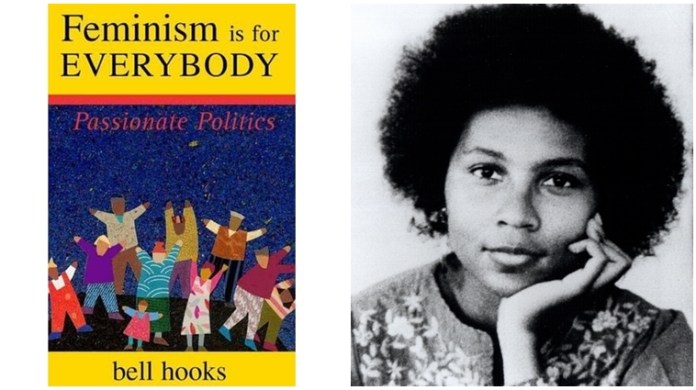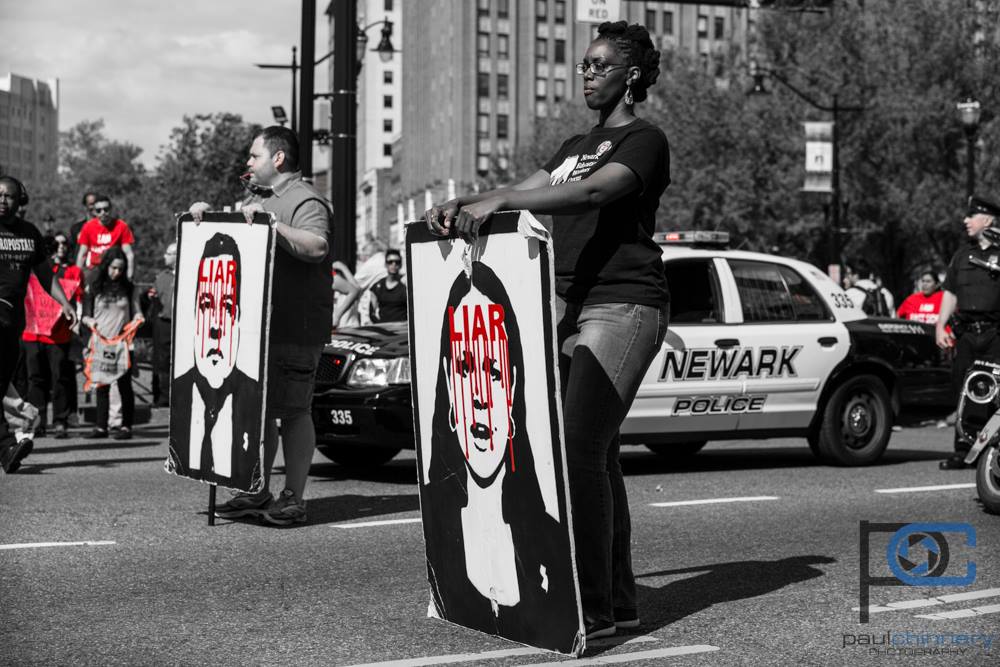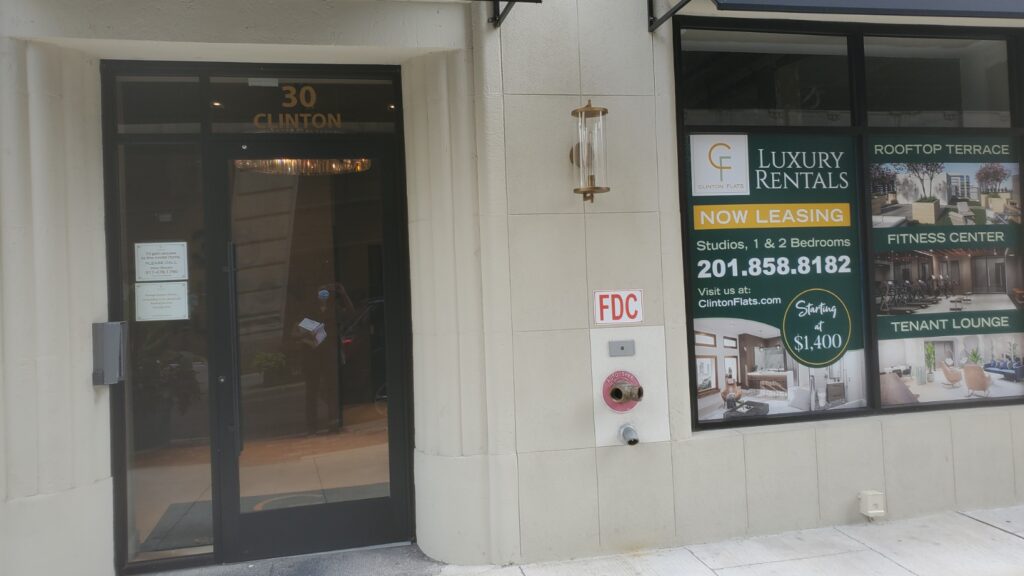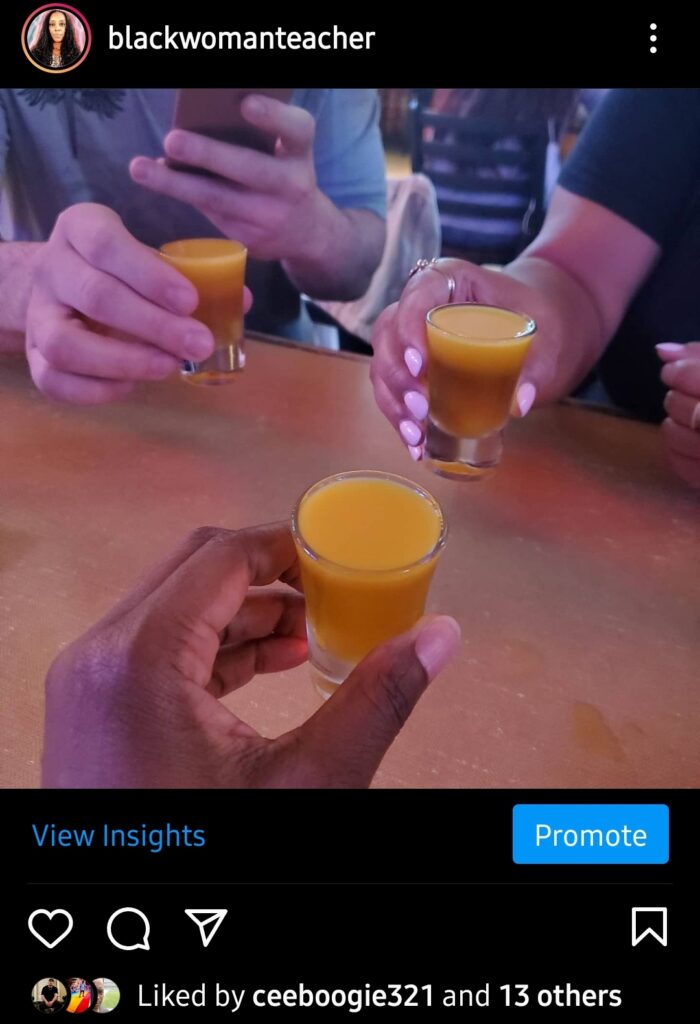hot water hits my skin
Dove deep in my nostrils
the furnace blows steam
eyes shut
anxiety swallowed
1 Commenta site exploring intersectionality and education

While grading response papers this fall semester, a few times I noted for students that bell hooks’s name is spelled using lowercase letters. I didn’t offer an explanation; I left that for them to discover on their own. But also, I didn’t know. I didn’t have a definite answer. I was in a classroom observing a student teacher when the notification popped up on my phone alerting me of her transition on Wednesday, December 15th. My immediate feelings were of sadness. Here’s another great loss. My mind also occupied a space of pride and appreciation because bell hooks will live on not only through her writings but also through her students and loved ones, just as James Baldwin, Audre Lorde, W.E.B. DuBois and so many others have done.
Many of the articles serving as obituaries used the explanation of bell hooks’s differently-spelled name in their headlines. BlackAmericaWeb.com reported a two-fold purpose: to honor her great-grandmother, Bell Blair Hooks, and to draw attention to her ideas rather than her name. I guess that worked on me. bell hooks’s name definitely made me wonder, who was this person who dared to be different? And I was pulled into a world that–although I didn’t completely understand or wasn’t completely committed to–I knew somehow was significant to the project I had begun of education transformation through the leadership of teachers.
Teaching to Transgress: Education as the Practice of Freedom is the first book I owned by bell hooks and a chapter of which was assigned on the abovementioned course’s syllabus. In this recent re-reading, I pulled the following quote to use in a talk: “Professors who embrace the challenge of self-actualization will be better able to create pedagogical practices that engage students, providing them with ways of knowing that enhance their capacity to live fully and deeply” (p. 22). This quote speaks to the book’s subtitle as well as the topic of my talk which was about critically evaluating our work as educators. Whether described as neoliberal, neoconservative, or neocolonial, global public education systems have career-readiness as a mainstay of their missions. hooks wrote and spoke of education having a liberatory purpose, having a purpose of overcoming oppression.
Seeing chapter titles in Teaching to Transgress such as “Eros, Eroticism, and the Pedagogical Process” and “Ecstasy: Teaching and Learning Without Limits” intrigued me–and made me uncomfortable. These were not words that usually came to mind when I thought about education and teaching. I had long earlier come to discover for myself the power of language during undergrad when I was drawn to study linguistics, sociolinguistics and Black vernacular more specifically. I have never felt like a “true” English major, or teacher for that matter, because I don’t have a love for literature. I have a love for structure, and how these structures both delimit and create. What I have come to commit to is a deliberate use of language in the process of re-constitution. This means diction, semantics, syntax, voice–power lies in what we say and how we say it.
A key point of the “Eros, Eroticism, and the Pedagogical Process” chapter is that thinking differently would lead to living differently. hooks discusses eros/eroticism as passion and a moving force, not merely existing in the sphere of sexuality. None of these ideas are welcomed in the traditional classroom, which reflects a White heteronormative capitalist patriarchal system. How can we transform if we’re told to stand still?
hooks also influenced my ability to name “a White heteronormative capitalist patriarchal system.” Feminism is for Everybody: Passionate Politics gave me a foundational understanding of feminism and gave me the confidence to identify as a feminist (later Alice Walker would develop my understanding of intersectionality through the identity of womanist). hooks’s writing is profound without being esoteric; this book truly is for and can be understood by anyone. She provides a definition of feminism as “a movement to end sexism, sexist exploitation, and oppression” (p. viii), making clear that being a feminist is not about being anti-male and that anyone, including men, can be feminists.
As a prominent cultural critic, bell hooks wrote regularly about race, gender, and class in society. Killing Rage: Ending Racism is a collection of her essays. And though published more than twenty-five years ago, the ideas explored ring true just as much today, particularly with critical race theory being debated in the political arena. A thread running through the chapters of this book is the central role White supremacy plays in maintaining the oppressive nature of our reality and how we must illuminate it every chance we get if we are to achieve a just and democratic society.
Rest in power bell hooks.
Leave a CommentYou and I met three times. First, at Barringer High School where we served on the School Leadership Council. You were a Community Representative and I was a teacher there. We didn’t get to know each other well, but I had a positive impression of you as a young guy who advocated for the students. You say you remember me from then, but I don’t believe you.
We met again at New Jersey Communities United some six or seven years later. There, you were one of the Lead Organizers and I was working under your direction on the campaign for organizing the in-home childcare providers. We became work friends and comrades around the education struggle. You were supporting NSU and I was an active member of NEW Caucus.

Aside from the job, I got to know “Mr C,” which is what the Dynamic Dynasty dancers who would stop by the office called you. I was impressed you had a-whole-nother life as a manager of a dance team. You were a true mentor for young people.
Our friendship grew over those four years, but we didn’t get close until after I left NJCU. I wanted to start a new iteration of millennials organizing for political change, to move the spotlight on our leadership and interests. You were the first one I called, the only one I could have thought to call first, and you were down. That was the third time we met–and when you became my brother.
This past weekend I felt zapped. I nearly slept the day away, chalking it up to my cycle. Monday, I got back on the ball and Tuesday was even more productive. I drove downtown to pick up flyers for my new business. It happened to be on Clinton Street with the old NJCU office. It had been a very long time since I’d been on that narrow, one-way. I parked in front of the old building. It is now condos. The new downtown. On my way back to the car, I snapped a picture and sent it to you: “You’ve probably seen this already but this is my first time. So weird 😲”

I head over to a school to flyer the parking lot. I remember being on the campaign trail together. You were committed to me. Like so committed. Back in the car, I head up the Parkway to drop off some flyers at a friend’s house. I receive a call and then another and another. They say you are gone. I don’t–won’t accept it. It’s the worst joke you could ever play and I can’t wait to cuss you out. I don’t know what’s happened and I don’t know where you are. I get home. I get more details. It was this weekend. This weekend. I believe you were here. I believe you were fighting. I wish I could have given you all my energy. But I didn’t know.
You accepted me for who I was, let me be me, and listened to me talk about who I wanted to be. We would talk for hours from the personal to the political, seek advice, bounce ideas, figure shit out.
You protected and cared for me. And now I feel less safe with you gone.
Loving friendships provide us with a space to experience the joy of community in a relationship where we learn to process all our issues, to cope with differences and conflict while staying connected.
bell hooks, all about love
You constantly told me you loved me and trusted me. Maybe you did it more as a reminder for yourself that you had people who genuinely cared for you; I did my best to let you know I felt the same exact way. How much your friendship meant to me. That you were truly my brother. I have a fear that expressing difference will divide me from others. But I never felt that with you. Even in our differences, we still loved each other.
My commitment is to carry your spirit with me everywhere I go. To hear your laughter, see your smile, and feel your hugs. To be present, to live in my truth to the fullest extent. To be everything you saw in me.

Just to get by
Just to get by
Just to get by
Just to get by
Do you really feel brand new?
Radio stations taking requests
Got me head nodding
Not wanting to get out my truck
Then it hits me,
What the fuck?
I usually drive in silence
Not wanting to hear the ear violence
Now you want to get conscious
In the aftermath of yet another tragedy
But only as long as it takes for me to shower and get dressed
Come back down and it’s the same nonsense
I know I can
I know I can
Be what I want to be
Be what I want to be
How hard are we working?
And I’m not talking about twerking
These incidents are no coincidence
It’s not happenstance but a clear plan
To create disaster and shock
Keep you shackled to the block
Forces unseen, yet to follow the laws of motion written by justice
It’s movement time.
Be. Be. Be.
Leave a Comment
Amanda Gorman, #talkback, & Anti-racist Pedagogy
January 2021 will be one of the most memorable months in my lifetime and I wonder ten years from now, what will the textbooks say about this moment in U.S. history? Who will determine the curriculum and who will write the narrative? Questions like these keep me thinking about yesterday, today, and tomorrow all at once for there is not much distinction among these time markers beyond the arrangement of numbers. Today is tomorrow’s yesterday and yesterday’s tomorrow.
Why will it be memorable? Amanda Gorman. Gorman’s poetry performance at the inauguration was inspiring and profound, crafted to #talkback to the insurrection orchestrated to stop the certification of November’s presidential election as well as the ideology of White supremacy on the whole . A line that struck me:
Democracy is an ideal, a social project hundreds of years in the making. It’s alive, and like any being it must be nurtured, care has to be taken. White supremacy is a constant threat to democracy and we must protect against it at all costs. One way this country purports to do this is through public education. The dominant narrative recited today about the purpose of public education is to prepare students for college and career. A historical perspective shows us preparing students for citizenship, and thus leadership, was just, if not more, important (albeit for a select class of people).
As teachers prepare lessons both today and tomorrow, they need to be prepared through the critical lenses of democracy and anti-racism–they the lessons AND they the teachers. An article shared on Facebook, “Wilmington 1898: When white supremacists overthrew a US government,” taught me about another coup led by White supremacists which was much more successful at enacting terror and thwarting democracy. This history is important to know as a singular event as well as part of a pattern of occurrences that brought us to our present. The day that teacher education centers study of history from a critical lens is the day that we’ll be in the position to prepare students to lead this world toward a just society.
2 Comments